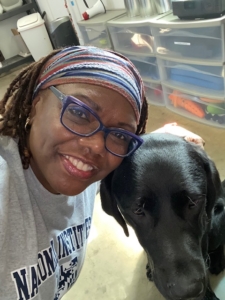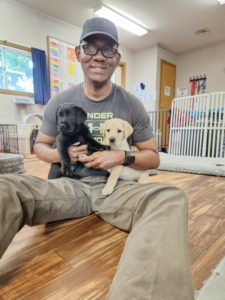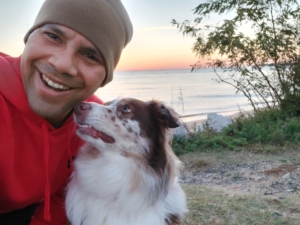Warrior Spotlight: April Ames-Chase
 Today we introduce you to U.S. Air Force Major (ret.) April Ames-Chase. She’s a Veteran who Warrior Canine Connection (WCC) had the good fortune to meet through its Mission Based Trauma Recovery (MBTR) training program in partnership with Wounded Warrior Project (WWP). We are privileged to share her story.
Today we introduce you to U.S. Air Force Major (ret.) April Ames-Chase. She’s a Veteran who Warrior Canine Connection (WCC) had the good fortune to meet through its Mission Based Trauma Recovery (MBTR) training program in partnership with Wounded Warrior Project (WWP). We are privileged to share her story.
April Ames-Chase was commissioned in the U.S. Air Force nine months after graduating from nursing school. Her four older brothers were all in the Air Force, so it was a big draw for her—to follow in their footsteps.
April spent 20 years in the Air Force as a registered nurse, which she says, “was the experience of a lifetime.” Her work took her to many duty stations both in the U.S. and abroad, including the United Kingdom, Korea, Japan, and Iraq.
Iraq was very different from previous assignments, as her time there was during the height of Operation Iraqi Freedom. She worked long, grueling hours at the hospital on base in Balad, where they were under constant mortar fire, and April says she saw too many combat casualties and often feared for her own life.
“I can tell you it was the camaraderie of fellow medics that got me through it because we all had one mission in mind, and that was to save every life that we could no matter how injured they were,” said April. “Our mission was to save their lives and send them back to the United States once they were stabilized.”
She says those four and a half months in Balad had a profound effect on her.
“As a nurse, when I came back from Iraq, I was a changed person,” said April. “My role changed to an administrator, and after my experience in Iraq, I saw it was a duty that I didn’t want to do anymore; I wanted to be able to go back to mental health and nursing where I could affect change within individuals and put my energy toward helping Veterans.”
The timing felt right, so April retired after 20 years of service to do the nursing work she loves. She’s now a Behavioral Health Nurse Specialist at the National Institutes of Health in Bethesda, Maryland where she works with patients, their families, and staff members.
April got invited to attend a WWP event and continued participating in several community projects, including laying wreaths in the cemetery, along with other events throughout the year.
“I just felt a connection with the individuals in Wounded Warrior Project by attending the events,” said April.
She saw information about WWC’s eight-week MBTR program and signed up.
“Oh, I loved it,” said April. “I traveled from Silver Spring, Md. there every week, which was quite a distance but well worth it. I looked forward to it every Saturday. The highlight was on my last day, taking Dollie to Starbucks with Emily and her dog. The dogs are loving, non-judgmental, and being in mental health, I know they raise our endorphin levels along with providing comfort and happiness—they’re life-changing.”
April continues to attend WWP events while balancing her work with finishing up her dissertation for her PhD, which focuses on the adaptation of female Veterans after returning home from Iraq—a subject which hits home for her both personally and professionally.
“Being in behavioral health, I’ve sought my own help where I’ve needed it and programs like those Warrior Canine Connection and Wounded Warrior Project offer, have been instrumental,” said April. “Whether it’s through interacting with the dogs or helping others by training future service dogs, or attending Wounded Warrior Project’s programs and events, it’s been so important for me to have these connection points and outlets for my own mental health. I highly encourage other Veterans who may be hesitant to get involved—they stand to benefit in ways they never realized.”
 Military service is a family tradition for Retired U.S. Army Sergeant Mike Milton; his brother, sister-in-law, cousin, and uncles, all served in the Armed Forces.
Military service is a family tradition for Retired U.S. Army Sergeant Mike Milton; his brother, sister-in-law, cousin, and uncles, all served in the Armed Forces.


